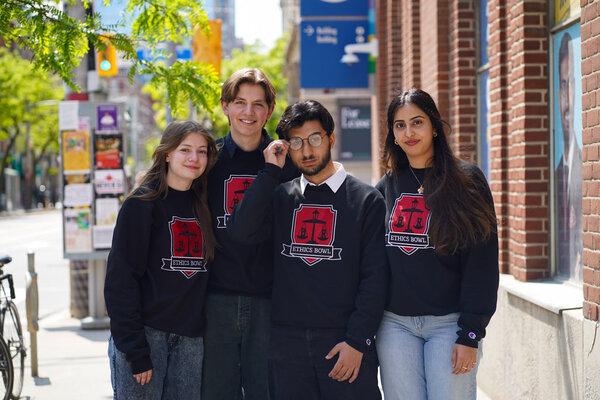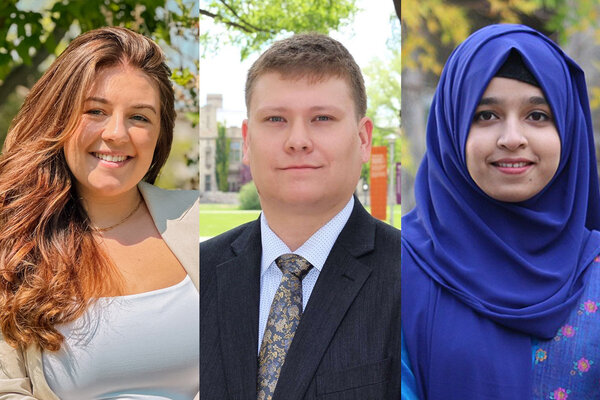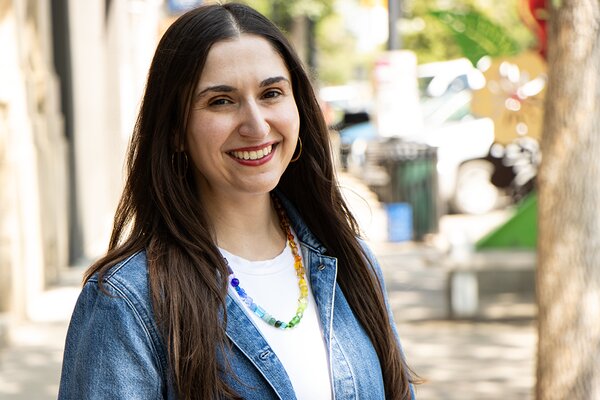News & Events
USask team wins first national College Ethics Bowl
Posted on 2025-06-30 in Politics & Society, Students & Campus Life

By Chris Putnam
A team of four University of Saskatchewan (USask) undergraduate students won first place at Canada’s first-ever national College Ethics Bowl in Toronto.
The USask team—College of Arts and Science students Isabelle Monsman and Will Shevkenek, and College of Kinesiology students Abdullah Amin and Gurleen Kaur—beat out seven other teams from across Canada to bring home gold from the event at George Brown College on June 1–2, 2025.
“It was very exciting!” said Shevkenek, a first-year political studies student. “Not many people get the chance to participate in the … inaugural event of a competition, let alone win it, and so we feel very grateful to have gotten the chance at this opportunity and will definitely be back to future nationals.”
An ethics bowl is an event in which teams go head-to-head in discussions of ethical topics connected to current social issues. Matches are structured similarly to debates, but with a greater emphasis on cooperation and collaboration. While Ethics Bowl Canada has organized ethics bowls at the high school level for nearly a decade, this was the first year an event was offered for university students.
“Everyone was very friendly, and it was a great experience to meet like-minded students from other universities across Canada. The matches themselves were very enjoyable. It was interesting to see the ethical approaches that other teams took towards the same cases that we had prepared for,” said Shevkenek.
Topics—or cases—discussed at the College Ethics Bowl included the risks and benefits of online political memes, the authenticity of AI-generated art, and the fairness of diversity-based hiring practices.

Dr. Pierre-François Noppen (PhD), a faculty member in the Department of Philosophy, said he was thrilled to see a USask team come in first place at the national competition. The assistant professor, who has been a driving force behind the Saskatchewan High School Ethics Bowl, sits on the Ethics Bowl Canada board of governors and helped initiate the university-level competition.
“(Ethics bowls) are an exceptional way for students to work very actively on developing their critical thinking skills,” Noppen said. “This is an opportunity for students to learn how to grapple with some of the challenges that they will face in their lives and that we collectively face.”
With help from the USask Philosophy Students’ Society, several USask teams formed this winter and participated in a virtual qualifier in January. Two USask teams attended the national event. College of Arts and Science students Hayley Allen and Hamza Saghir, along with College of Education student Blake Kemmer, made up the second team.
Noppen helped the USask teams prepare for the event and secure funding. Stipends from the Arts and Science Scholarship Enhancement Trust and the USask President’s Office helped pay for the students’ travel to Toronto.
Noppen said he wasn’t surprised to see the USask students excel at the national competition, as their arguments were “very, very sophisticated.”
But strong arguments alone are not enough to win an ethics bowl match. Participants are expected to genuinely listen to the opposing team’s presentation and alter their viewpoints in response. Shevkenek said his team’s flexibility and humility in their perspective helped give them the edge.
“This is likely one of the hardest things to do well consistently in ethics bowls and also what helps you to win rounds that are extremely close otherwise.”
The national College Ethics Bowl will return next year. Noppen believes participation in the event benefits students and society at large.
“(In our society) we cannot expect agreement. Agreement is the exception. And so we have to become comfortable living within disagreement and with people who disagree with our views, and find constructive and productive ways to move forward,” he said.
Related Articles
Three questions with Chief Felix Thomas
Posted on 2025-07-23
Arts and Science graduate (BSPE’88, BA’90) and Alumni of Influence Award recipient discusses his path to First Nations advocacy
USask linguistics student awarded for international scholarly, research work
Posted on 2025-07-17
Arts and Science student Caelan Osborne discusses impact of international learning, research experiences
In conversation with English undergraduate award winner Elisabeth Bauman
Posted on 2025-07-10
Multi-award-winning English student shares her surprising journey
Three USask students recognized nationally with Vanier scholarships
Posted on 2025-07-09
The Vanier Canada Graduate Scholarships are among the most prestigious awards for doctoral students in Canada
Book details strike at the former INCO in 1958
Posted on 2025-06-30
USask sociology professor Dr. Elizabeth Quinlan (PhD) is interviewed about her new book Standing Up to Big Nickel: The Story of the Mine, Mill and Smelters Workers Strike
Award-winning poet, USask grad explores queerness and identity
Posted on 2025-06-30
Leah Horlick (BA’10) discusses her career, advice for students exploring writing, identity





